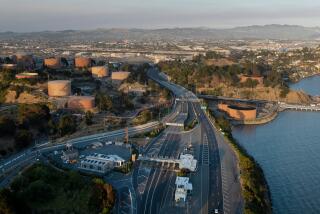Chevron Agrees to Sell 4,000 Gasoline Stations to Cumberland Farms
- Share via
Chevron said Friday that it has agreed to sell a network of 4,000 gasoline stations in 10 Northeastern states to Cumberland Farms, a family-owned convenience store chain based in Canton, Mass.
The sale was one in a series of deals announced Friday involving most of Chevron’s Northeastern marketing properties. The San Francisco-based oil company said it expected to realize $500 million in cash from the sales, which it would use to reduce its debt.
The nation’s No. 2 oil company has sold various oil and gas properties over the last several months to reduce the debt that it took on when it acquired Gulf Oil for $13.2 billion last year. The $500 million from the sales would lower Chevron’s debt to $10.4 billion from its current $10.9 billion. The debt was $15.5 billion at the begining of the year.
The sale would transform Cumberland Farms from a fairly small gasoline marketer to one of the largest in the Northeast. Chevron ranks among the top five sellers in the Northeast, where it accounts for 7% of petroleum products sales, primarily gasoline. Cumberland currently operates 600 gasoline stations located at convenience stores in the Northeast and Florida.
Chevron said it owns 520 gas stations involved in the sale, and the rest are supplied under contract. It said it may continue to supply some of the gas stations under a contract with Cumberland.
Other Sales Announced
The company said it also agreed to sell four heating oil businesses to Champion Oil of Greenwich, Conn; its interest in a southeastern Pennsylvania pipeline to the Penn Central Energy Group of Tulsa, Okla., and its Bulk Petroleum, a no-frills gasoline marketer based in Chicago, to R. J. Evensen, the manager of Bulk Petroleum.
Chevron said final details of the sales wouldn’t be worked out for another six months. Most employees in the various businesses would be offered jobs by the new owners, Chevron said, and the rest would be offered severance benefits.
Craig Schwerdt, oil industry analyst with Morgan, Olmstead, Kennedy & Gardner in Los Angeles, said the proceeds from the sale were “no surprise” and “about what Wall Street expected.”
Chevron didn’t disclose the prices for individual sales. It did say, however, that the proceeds include about $210 million worth of inventory, mostly gasoline. An undetermined amount of gasoline would be sold to Cumberland Farms and the rest on the open market, the company said.
Chevron had originally said it wanted to sell its Northeastern properties as a package that included its refinery in Philadelphia along with another 800 gas stations in Maryland, Virginia and Washington.
“The just bids didn’t come in that way,” said Willis J. Price, the Chevron vice president who oversees refining and marketing operations. He said he was satisfied with the results of the three-month-long bidding process.
“We weren’t forced to sell,” he said.
Price said Chevron would continue to look for a buyer for the 174,000-barrel-a-day refinery in Philadelphia, but would keep the 800 gas stations. He said Chevron might sell a much smaller 45,000-barrel-a-day refinery in Cincinnati if it determines that the facility is no longer needed as a result sale of gas stations.
Difficult to Sell
Chevron is continuing to review bids on a package of its Puerto Rican properties that consists of 275 gas stations and a 38,000-barrel-a-day refinery.
Most refiners have had difficulty selling refineries because of the current glut of refining capacity. Since 1981, more than 100 refineries have closed, and those that remain open are not operating at capacity. Schwerdt said, for example, that Atlantic Richfield virtually gave away its Philadelphia refinery to Dutch oil trader John Deuss in a $420-million deal that included a network of 576 gas stations.
Besides the gasoline stations, Cumberland is acquiring use of the Chevron and Gulf trademarks, and its customers will continue to be able to use Chevron and Gulf credit cards. Price acknowledged that the arrangement would contribute to the confusion that already exits as a result of Chevron’s sale of a Louisiana refinery and 5,660 Southeastern stations to Standard Oil (Ohio) last year. As part of that $690-million deal, Chevron allowed Sohio to continue to use the Gulf name for several years. The Cumberland deal would mean that the Gulf brand would be sold by three different marketers.
“Among the three of us, we’ve got an important challenge to make sure our customers understand the distinction between the Gulf brand marketed by three different companies,” Price said.
More to Read
Inside the business of entertainment
The Wide Shot brings you news, analysis and insights on everything from streaming wars to production — and what it all means for the future.
You may occasionally receive promotional content from the Los Angeles Times.










